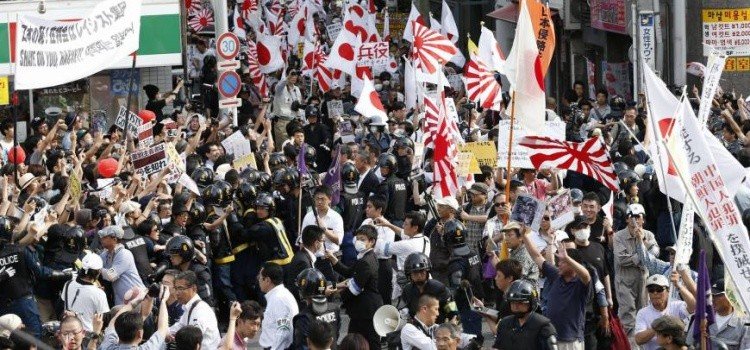Something widely discussed among foreigners who live in Japan is the famous slang gaijin [外人] which is nothing but the abbreviation of the word gaikokujin [外国人] which literally means foreigner, or someone who comes from outside the country. In this article, I want to examine that word in depth, its meaning and how the Japanese usually use it.
The ideogram [外] means outside or exterior, while the ideogram [国] means country, region, and state, and the ideogram [人] refers to people. The combination of these 3 ideograms creates the word gaikokujin [外国人], which means foreigner.
Some people are easily offended when they hear the word gaijin. Many believe that the abbreviation of the word gaikokujin sounds quite racist, but in my opinion, this is a very childish view. Is the word gaijin really that bad? Are the Japanese aware of this?
Table of Content
Why does the word gaijin cause so much discussion?
If we examine the meanings of the word gaikokujin [外国人] on websites like jisho, it will provide the meanings foreign, foreign citizen, person from outside the country, and even alien. What does alien mean? In reality, the word alien in English does not refer only to extraterrestrials. And literally, extraterrestrials are from outside the country, from outside the earth, from outside the galaxy.
The Japanese language, while many synonyms for the same thing, has many words with different meanings. Just today I got confused when a Japanese woman used the word vacation yasumi [休み] which can also just refer to a day off or a night's sleep.
Thus, the abbreviation gaijin [外人] that the Japanese use carries a meaning beyond foreigner. If we use jisho.org, the word gaijin will also point to the English word outsider. This English word means strange, outsider, intruder, layman, and even profane. However, the dictionary itself states that this is an archaic meaning of the word (old, no longer in use today).
How can the simple removal of the ideogram country [国] cause so much conflict? There are various Japanese expressions and words used in formal conversations, magazines, television, and media that use the abbreviation gaijin [外人]. Even when talking about foreign athletes, they use gaijinsenshu [外人選手].

Descendants disappointed not to be Japanese
Another big reason the word gaijin causes so much fight and hatred is in the community of Japanese descendants who live in Japan. The Japanese often call even people who were born in Japan and are children of descendants of gaikokujin or gaijin. Even though they look Japanese, they are still called gaijin.
Even if the person using these words has xenophobic intentions, in my opinion, unfortunately, it's normal. In Brazil people call all descendants who have never had any connection with Japan, Asians, Japanese and sometimes even confuse with Chinese and Koreans. Both in Brazil and in Japan, this will happen to mestizo people.
It is worth remembering that mestizos are called ha-fu [ハーフ], which comes from the English word half. There is also a pun with the word gaijin using the characters [害人], where the character [害] means victim, prejudice, influence of evil, and harm.
It is worth remembering that there are not only ethnic issues in the word gaijin [外人]. This Japanese word refers to someone from outside, even a Japanese without any descendants who are born and raised abroad without the molds of Japanese culture can be called a gaijin. Likewise, a non-Japanese man can avoid being called a gaijin if he is fully immersed in Japanese culture and language.

- Brazilian polyglot who lives in Japan (Example of someone who managed to enter Japanese society, even without descendants);
Words Related to foreigner [gaikokujin]
Before the Meiji era, the term for foreigner was Ihojin, ikokujin, and ijin. These terms are indeed offensive, because ikokujin [異国人] is written with the ideogram [異] which means strange, different, curious, unusual, and odd. The funniest thing is that in Japan there is the foreigner card [gaikokujin torokusho] which is often translated as Alien Card.
The ideogram [胡], which literally means barbarian, also means foreigner. This ideogram is often used in words like suspect, shady, and questionable. But it is also an innocent kanji used in words like pepper and cucumber. Its origin is related to ethnic groups in China.
Even the word kedoujin [毛唐人] has been used to refer to barbarians and foreign Chinese and Europeans. The big problem with this word is the kanji [毛] which means hair. The Japanese literally called foreigners hairy, probably because of the beards of Europeans.
Below we leave a list of words related to the word gaikokujin:
| Portuguese | Japanese | Romaji |
| Imported, foreign (came from abroad) | 外来 | gairai |
| Foreign currency, foreign money | 外貨 | gaika |
| Foreign country | 外国 | gaikoku |
| foreign minister | 外相 | gaishou |
| Another country, another state, foreign land | 他国 | takoku |
| Xenophobia | 外国人嫌悪 | gaikokujinken'o |
| white person, caucasian | 白人 | hakujin |

The innocence of the Japanese with the word gaijin
Most Japanese people, especially young ones, have no idea about the origins of their words or history. For about 98% of Japanese people, the word gaijin is nothing more than an abbreviation of the word gaikokujin. Abbreviating words is very common in Japan; some examples are the words pokemon (poketto monsutaa) and kokuren (kokusai rengou).
Just as the Japanese call foreign cars gai-sha [外車], they will refer to foreigners as gaijin, this is something automatic and normal. Unfortunately, many do not understand this and it leads to personal feelings. It doesn’t matter if the word is positive, negative, or neutral; it all depends on the intention of the person speaking.
We are not saying here that Japanese people do not use this word in an offensive way, because that happens in all countries. Even more so in Japan where xenophobia and racism occur in a hidden manner. Since Japanese people do not usually express what they think. We just want to make it clear that the word gaijin, in itself, is absolutely nothing wrong.
I believe that just as foreigners are not irritated with Americans (the most racist country in the world) because of the word foreign which also means: exotic, other, alien, outsider, and barbaric. We shouldn't be upset to hear the word gaijin, unless it is accompanied by baka or in an offensive tone.
